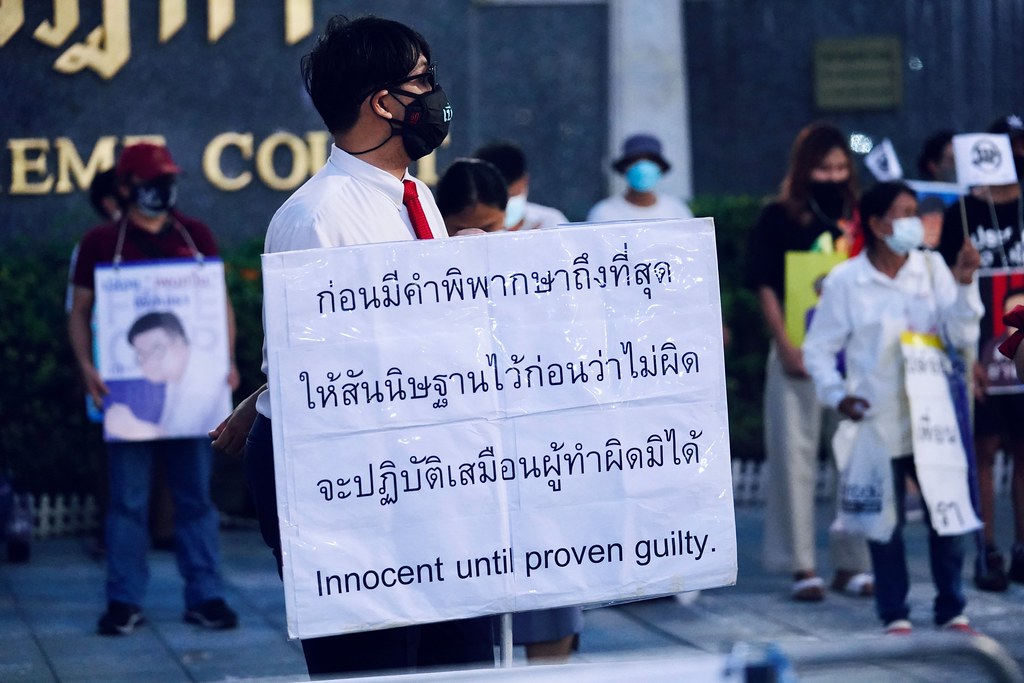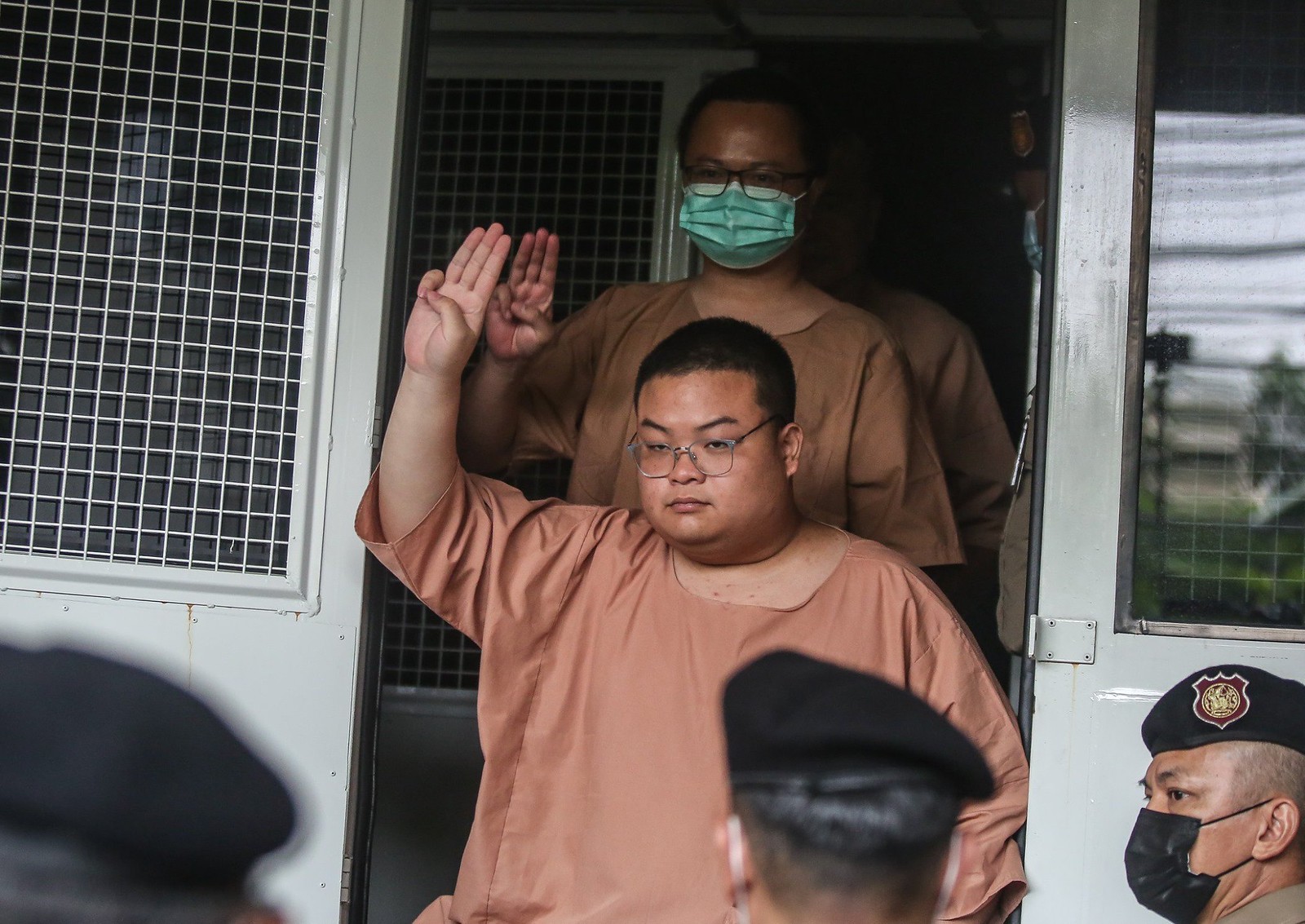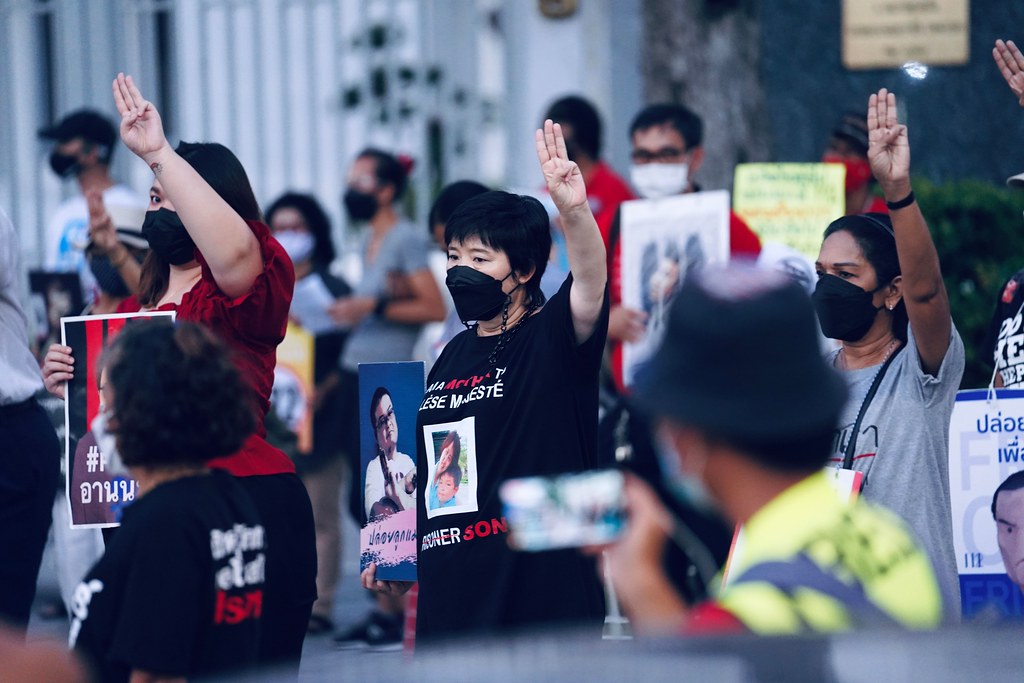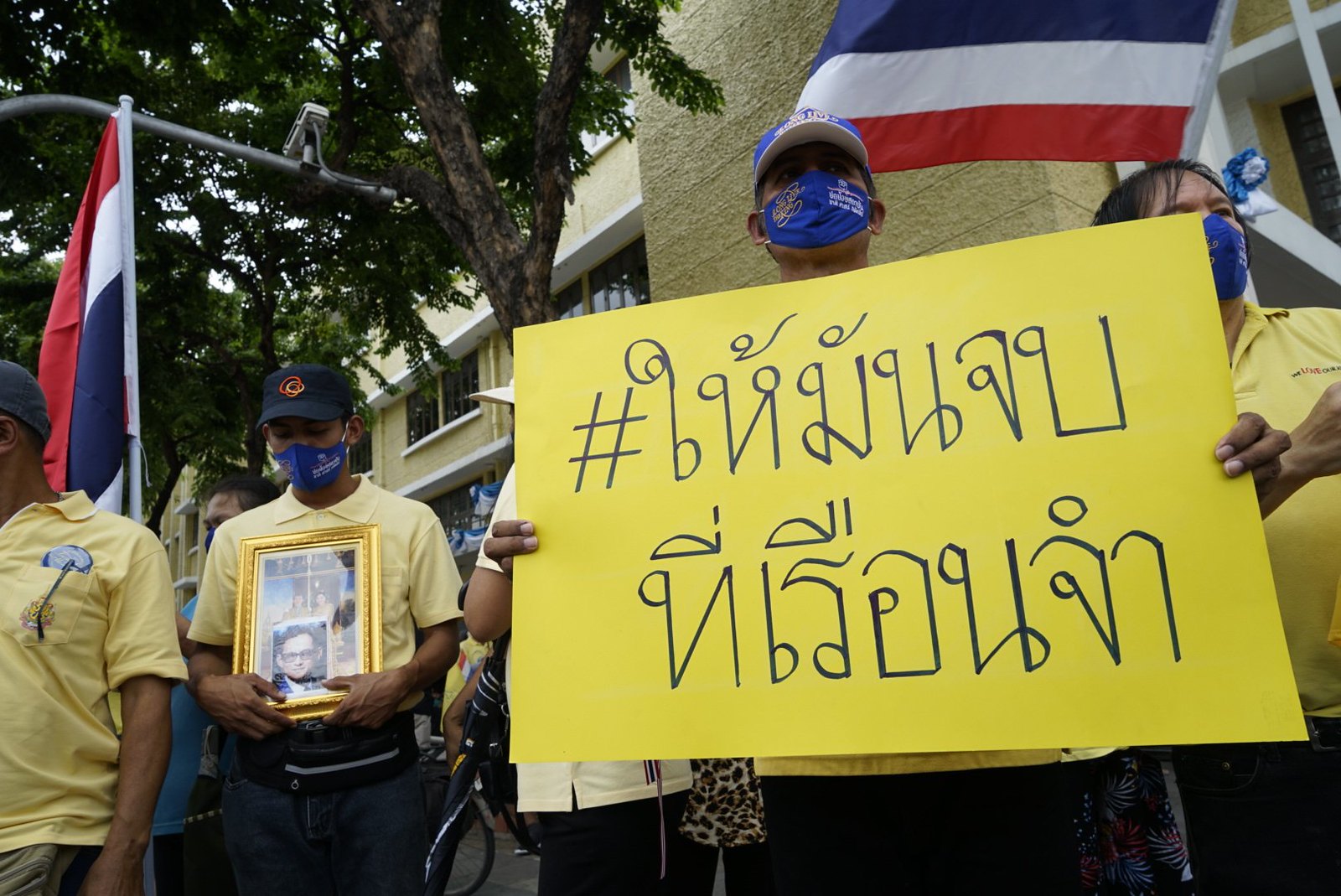Individuals accused of insulting the monarchy are paying astronomical sums of money – sometimes in the millions of baht – to secure their freedom while their cases are ongoing, a practice that one law scholar said could amount to violating the constitutional right to a fair trial.
A woman is running a crowd-funded charity to help pay the bail for those who can’t afford it. But the odds are against her, as cases of royal defamation continue to rise, and even the basic principle of “presumption of innocence” is not always guaranteed.


A group of demonstrators protest outside the Supreme Court in Bangkok on 24 September 2021 to demand the release of suspects charged with royal defamation.
One evening in February, after spending months behind bars in pre-trial detention, two monarchy reform activists were told by a judge that they were allowed to post bail and walk free. One major caveat: their bond was set at 2,070,000 baht. And they had one hour to pay it, in full. Cash only.
Just a day earlier, a man charged with royal defamation for allegedly throwing red paint at a portrait of King Vajiralongkorn required up to 600,000 baht for his bond. In January, another man charged with the similar crime in Mae Hong Son had to post 150,000 baht as his bail guarantee.
Yet another bond, this time worth 200,000 baht, was pressed on a woman accused of insulting the King in a speech in front of the German Embassy.
“According to the law, there is the prior presumption that if a suspect is still innocent, they must be treated as if they have not done wrong. … It must be made easy for them to post bail. Bail should be the norm, not an exception,” Winyat Chatmontree, an attorney who represents many defendants accused of royal insult, or lèse majesté, said in an interview.
“But at present, denying bail has become the principle. You have to put up very high amounts of money in exchange for it.”
Although the concept of “presumption of innocence” is enshrined under the Constitution, many judges continue to order suspects in royal defamation cases to pay hundreds of thousands of baht in return for their freedom to contest the charge outside prison. The practice is widespread, in spite of a very shaky legal basis, according to a law lecturer, who warned that the courts risk tarnishing their image of impartiality.
“When it comes to Section 112, the courts might be very careful out of fear that if they let them go, they will be accused of being part of the same group,” said Prinya Thaewanarumitkul, an academic who teaches constitutional law at Thammasat University.
“But the court must stick to the rules,” Prinya went on. “The court must be very careful about this. If the court exercises the law carelessly, it could even affect the monarchy itself, because if there is no bail, people might wonder if there's been any order to do this.”
A steep price
Under Section 112 of the Criminal Codes, royal defamation is punishable by up to 15 years in jail. While the letter of the law only covers deeds or words that “insult” or “threaten” the King, Queen, Heir Apparent, and Regent, the offense is routinely extended to include any action that can be deemed negative toward the Royal Family.
Individuals who stand accused of the crime are often brought before the court, when police investigators recommend that the court remand the suspects in custody while the trial is ongoing, citing flight risk.
If the court rejects the police recommendation, it can either rule that the suspects walk free without having to post any bail, or impose a bond that requires a large sum of money. The latter is an increasingly common outcome, with many bonds being set in the range of hundreds of thousands of baht in cash – far higher than the average monthly salary in Thailand. Those who can't come up with the money are sent to prison.

A demonstrator protests outside the Supreme Court in Bangkok on 25 October 2021 to demand the release of suspects charged with royal defamation.
This is where the Will of the People Fund stepped in. Founded in the aftermath of the 2014 coup as an initiative to support political prisoners who could not afford bail, the charity has been playing a critical role in providing the bond money in many recent cases that involved royal defamation.
The money is raised through donations from the public. The day-to-day operation is run by just two volunteers, one of them being writer Ida Aroonwong. Despite having no formal training as a lawyer, the pair kept the charity running with meticulous detail, from submitting the bond money across different court jurisdictions and keeping track of the money to fundraising donations.
“It’s rather a complex process and is becoming a major burden that causes us massive headaches,” Ida, a publishing editor at a journal called Aan, said in an interview. “But we’re aware that the two of us hold this account, so we have to be strictly responsible for every single baht.”
She added, “It’s the public’s money, not ours.”
The Will of the People Fund, or “Ratsadon Prasong” in Thai, also assists demonstrators charged with violating the Emergency Decree ban on political gatherings and other offences. Many of them are young people from low-income backgrounds. The charity’s Facebook page details each case in which the money is used to pay for their bond.
Some of the amounts asked by the court are bewildering. The highest bail the fund has had to put down so far stands at 3.1 million baht. That was back in August 2021, when the court set down a bond of 100,000 baht for each of 31 protesters, even though they did not resist arrest and made no attempt to flee the scene, Ida said.
There was also the infamous incident in February where the court asked for a bond of 2,070,000 baht for activists Anon Nampa and Parit “Penguin” Chiwarak, which had to be paid within an hour.

A file photo of pro-democracy activists Anon Nampa and Parit “Penguin” Chiwarak.
Ida said she was taken aback not only by the amount, but also by the court’s reasoning: the judges said if the money could not be presented that night, the process would have to start over the following morning, and the judges may have changed their mind by then.
“The court may not give us any guarantee whether they will still grant bail like before,” she said. “Ultimately, I still can’t understand it. If the court agrees to grant bail at 6 pm one evening, by 8 am the next morning, what facts would possibly change overnight outside the court’s opening time that could lead the court to have to change their mind and not grant bail?”
In spite of the abrupt notice, the fund managed to collect not just 2 million, but 10 million in donations in just under an hour – a phenomenon seen by many as an extraordinary gesture of solidarity with Anon and Parit.
Inconsistent and unpredictable
The bail set for royal defamation cases and suspects accused of political offences, like joining demonstrations, often raises eyebrows because many of the amounts are equal to or even higher than for cases that involve far more serious crimes, like manslaughter and sexual assault.
To cite a recent example, a policeman on a motorcycle who struck and killed a doctor at a pedestrian crossing in Bangkok earlier this year walked free after posting a bond of 50,000 baht.
In December 2021, a court set the bond for a policeman’s son who allegedly raped a 17-year-old student at 200,000 baht. When a group of five schoolteachers were arrested in 2020 on allegations of sexually assaulting a student – a minor – they were allowed to post bail at 30,000 baht each.
By comparison, 31-year-old writer and cartoonist Harit Mahathon who was recently acquitted of royal defamation had to post bail of up to 500,000 baht, his lawyer said.
“In cases where the defendants are accused of offences against the monarchy, national security, or national leaders, their bail is usually set very high,” said Winyat, the attorney who represents Harit and other defendants, “because they see these people as opponents of the state, or as someone who may cause damage to the state.”

A group of demonstrators protest outside the Supreme Court in Bangkok on 25 October 2021 to demand the release of suspects charged with royal defamation.
There are guidelines on setting the amount of bail, like recommendations issued by the Supreme Court in 2019, yet the numbers don’t always add up. In that document, judges are explicitly told that a bond for offences which carry a maximum penalty of 15 years in prison should not exceed 300,000 baht – far lower than what Harit and other defendants have had to pay.
Even more puzzling, Ida said, is the fact that the amount of money for bail asked by judges for the same offence varies from one court jurisdiction to another.
“For Section 112 cases, why do the provincial courts in Samut Prakan and Narathiwat have the consistent rate of 150,000 baht for every case? And why is the rate for Phang Nga Provincial Court higher than others, at 300,000 baht, even though the cases similarly involve posting messages on social media?” Ida asked.
That amount, 300,000 baht, was imposed by a court in Pathum Thani in a case that involved singing, while the bond set by the Taling Chan Criminal Court for royal defamation suspects can be anywhere between 100,000 to 250,000 baht.
Even the very same court can change its bond rate over time without any apparent reason, she said; South Bangkok Criminal Court used to set bail for royal defamation at 150,000 baht. Now the fee has risen to 200,000 baht, regardless of the nature of the alleged offence.
“We can’t make any predictions at all,” Ida said. “So does any tariff even exist?”
A discretionary process
The discrepancy is usually explained away by a term ubiquitous in so many layers of Thailand’s legal enforcement: discretion. While guidelines on bail amounts do exist, it is up to the presiding judges to set the actual amount.
“There are not many points to consider. For example, is the bond credible? If released, will they flee? Or if they are released, will they tamper with the evidence or obstruct the investigation?” Winyat said.
“I say it’s a question of discretion [Section 112 cases]. It is something that creates difficulties, and it restricts the rights of the people in accessing temporary release.”
Prinya, the law scholar from Thammasat University, also said that some of the reasons given by the courts for either setting a high bail for royal defamation suspects, or rejecting bail altogether, have no standing in the legal system at all.
For instance, when the court denied bail for 23-year-old activist Benja Apan in October, it said the decision was based on the “long prison term” associated with royal defamation. A different rationale was given by the court in November, when it denied bail to activist Panusaya “Rung” Sithijirawattanakul; if she was freed, the court said, “the defendant may commit a similar offence in the future.”

A file photo of pro-democracy activist Panusaya “Rung” Sithijirawattanakul.
Neither is a valid reason for denying bail to defendants, said Prinya, who pointed to Article 108/1 of the Criminal Procedure Code, which governs the bail process.
Under that law, the court may deny bail only if the defendant displays a risk of absconding from the trial; tampering with evidence; causing harm; interfering with the legal process; or if their bail security proves to be unreliable.
None of the provisions involve “long prison terms” or the risk of the suspect “committing a similar offence.” Prinya also noted that rejecting bail on the grounds that royal defamation carries a high prison term is illogical in itself, since bail has been routinely granted to suspects charged with offences that carry higher sentences, like murder.
“The court should not cause anyone to have suspicions,” Prinya said. “If there are different practices and bail in some cases comes with a higher surety, making bail more difficult, and with more conditions than other cases, comparisons will be made.”
The Office of the Judiciary, which oversees judicial affairs, would not provide a comment for this story. When Prachatai English requested an interview with spokesperson Sorawit Limparangsi, his aide said he declined.
“He cannot give any comment because it will be an infringement on the court’s authority,” the aide said. “Setting the criteria for bail is at the discretion of each judge.”
Everybody's got a price
When a suspect is required to post bail in cash, the money is collected by the court clerks, and then kept in safekeeping at the Office of the Judiciary, usually in the form of bank accounts or government bonds.
Although the judicial authorities are banned from using the bail money posted by defendants for commercial purposes, any interest generated by the deposit goes into the state coffers, and not the defendants’ wallets, Winyat the attorney said.
“What does the owner of the money get? They get freedom,” he said.
The money is only returned to the defendants after the verdict is reached, which may take years, effectively freezing assets the size of life savings for many. In the case of Harit, the cartoonist who was acquitted in Wednesday’s ruling, the court proceedings took 6 years, during which time he had to deposit 500,000 baht as his bond guarantee.
Defense lawyer Winyat said some of the people he represented, namely protest leaders, had to post even more cash for bail when they had to travel overseas. In one case, where the defendant was told to put down 600,000 baht as a bond, they were told to put down another 600,000 baht before leaving Thailand.

Phromsorn Viradhammajari, accused of royal defamation, hugs a supporter upon being freed on bail in Pathum Thani province on 10 May 2021. His bail was set at 200,000 baht.
Some didn’t get the bail money back at all for reasons beyond their control, as in the case of Pranee Danwattananusorn, whose husband Surachai Danwattananusorn went missing in 2018 while in exile in Laos.
Surachai, who regularly criticized the monarchy, fled the country shortly before the military seized power in 2014, while his royal insult trial was ongoing. Although his friends and family believe he was murdered after his abduction in 2018, the court considered him to be alive and treated his case as bail-jumping, and seized all of his 500,000-baht bond according to Pranee.
The court’s seeming obsession with ordering royal defamation suspects to pay in cash also runs contrary to the spirit of the law, Prinya said. Article 110 of the Criminal Procedure Code states that judges may opt to release suspects on bail without having to post any bond, or if a bond is required, it does not have to be cash.
In fact, it is common for university professors and lawmakers to vouch for suspects in lieu of a bond. Earlier this year in January, the Thanyaburi Provincial Court granted bail to a royal defamation suspect – a student from Thammasat – because an unidentified lecturer used their position as a surety. Yet in many other similar cases, MPs and professors who attempted to do the same were turned away.
“The principle is to prevent flight. If there is a way, it doesn’t need to use money,” Prinya said . “The law anticipates that otherwise poor people – people without money –go to jail.
“We don’t have the same amount of money. If we use money as a condition [for bail release], it goes against the principle of equality.”
Unconstitutional?
The concept of fair trial is relatively new in the history of Thai law. For hundreds of years, the accused were tried on the presumption that they were guilty until they could prove their innocence.
The first criminal procedure code was compiled and introduced only in 1934, two years after the country became a parliamentary democracy thanks to the revolt led by Pridi Banomyong – a French-educated law scholar.
“But even then, there was no presumption of innocence’,” Prinya said.
That came much later. Thailand would have to wait for 15 years before the presumption of innocence made its way into the country’s highest law, when the 1949 Constitution for the first time included the phrase: “A suspect or defendant in a criminal case shall be presumed innocent, and before the passing of a final judgment convicting a person of having committed an offence, such person shall not be treated as a convict.”
The same phrase can be found in the series of charters that followed, including the current one, enacted in 2017. Yet the 1934 Criminal Procedure Code, which is still in use to this day, remains largely unchanged.

A group of hardline supporters of the monarchy gather on 16 August 2020 in support of tougher punishment for alleged insult of the Royal Family in Bangkok.
This explains why the Criminal Procedure Code is riddled with terms and protocols that assume the accused to be guilty until they can prove their innocence in court. The contradiction is perhaps the clearest in the bail protocol, Prinya said.
“[The Criminal Procedure Code] does not call it ‘bail’ but ‘temporary release,’” the scholar said, with incredulity audible in his voice. “It is assumed that the principle is imprisonment; their release is temporary.”
He added, “This still uses the presumption of guilt, where [defendants] must be held in custody first until the verdict, and later wait to see whether there is any reason why they should be released, and then release them.”
Prinya said he’s also alarmed by the news about judges citing reasons beyond what is stated in the Criminal Procedure Code in their decisions to deny bail to some royal defamation suspects, especially since Section 29 of the Constitution unequivocally allows only one legitimate reason for ordering a suspect or defendant to be detained: if it is necessary to prevent them from absconding.
It is not unheard of. In January 2021, an appeal court denied a 63-year-old woman bail on the grounds that her offense “brought damage to the monarchy, which is a revered institution, causing offence to the hearts of the loyal subjects,” among other reasons.
“If the court comes up with any other reason, that’s a violation of both the Criminal Procedure Code, and the Constitution,” Prinya warned.
‘We won’t run away’
There are about 1,700 individuals currently being prosecuted for charges related to free speech and the rights to freedom of assembly, according to Thai Lawyers for Human Rights, a group that provides legal assistance to many of the suspects. About 170 are charged with royal defamation, as of February 2022.
Ida said the Ratsadon Prasong Fund will continue to post bail on behalf of defendants who need it, even as she and her colleague come under scrutiny and threats of harassment from hardline supporters of the monarchy.
In February, pro-monarchy activist Sonthiya Sawasdee urged the police to investigate Ida and her role in the Ratsadon Prasong Fund, accusing her of abetting the “anti-monarchy” movement.

Protesters calling for reforms of the monarchy gather in front of the German Embassy in Bangkok on 26 October 2020.
An article on Thai Post, a news agency that often serves as a mouthpiece for the ultraconservative faction, also implied that Ida’s initiative is a disguised effort to encourage anti-monarchy elements.
“In my regular life, I live in the same way as many people who know they’re under the eyes of the state. Living like this, I know that my phone and social media no longer have any privacy.” Ida said. “I am already resigned to the fact that any day they will stage a raid, seize my phone, seize my computer, and search my home at any time.”
She also said they often receive threatening messages whenever there is a major fundraising for bail money, though they remain undaunted.
“I’m pretty sure that we won’t get justice if it gets to the point where we get charged, but we won’t close down the fund or run away,” Ida said. “We will continue to do what we want them to do, which is firmly insisting on the principle that the law must be the law.”


